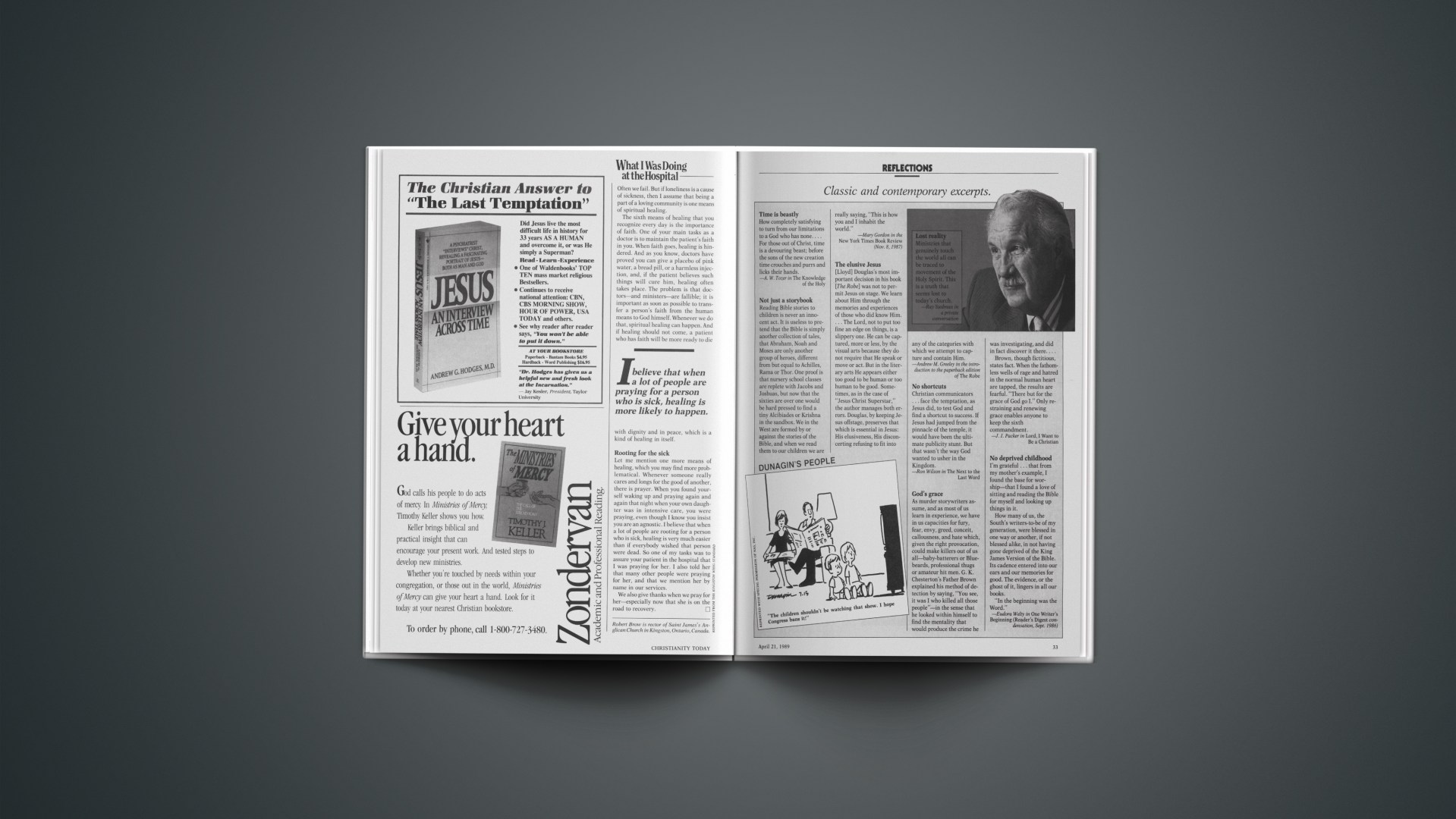Time Is Beastly
How completely satisfying to turn from our limitations to a God who has none.… For those out of Christ, time is a devouring beast; before the sons of the new creation time crouches and purrs and licks their hands.
—A. W. Tozer in The Knowledge of the Holy
Not Just A Storybook
Reading Bible stories to children is never an innocent act. It is useless to pretend that the Bible is simply another collection of tales, that Abraham, Noah and Moses are only another group of heroes, different from but equal to Achilles, Rama or Thor. One proof is that nursery school classes are replete with Jacobs and Joshuas, but now that the sixties are over one would be hard pressed to find a tiny Alcibiades or Krishna in the sandbox. We in the West are formed by or against the stories of the Bible, and when we read them to our children we are really saying, “This is how you and I inhabit the world.”
—Mary Gordon in the New York Times Book Review (Nov. 8, 1987)
The Elusive Jesus
[Lloyd] Douglas’s most important decision in his book [The Robe] was not to permit Jesus on stage. We learn about Him through the memories and experiences of those who did know Him.… The Lord, not to put too fine an edge on things, is a slippery one. He can be captured, more or less, by the visual arts because they do not require that He speak or move or act. But in the literary arts He appears either too good to be human or too human to be good. Sometimes, as in the case of “Jesus Christ Superstar,” the author manages both errors. Douglas, by keeping Jesus offstage, preserves that which is essential in Jesus: His elusiveness, His disconcerting refusing to fit into any of the categories with which we attempt to capture and contain Him.
—Andrew M. Greeley in the introduction to the paperback edition of The Robe
Lost Reality
Ministries that genuinely touch the world all can be traced to movement of the Holy Spirit. This is a truth that seems lost to today’s church.
—Ray Stedman in a private conversation
No Shortcuts
Christian communicators … face the temptation, as Jesus did, to test God and find a shortcut to success. If Jesus had jumped from the pinnacle of the temple, it would have been the ultimate publicity stunt. But that wasn’t the way God wanted to usher in the Kingdom.
—Ron Wilson in The Next to the Last Word
God’S Grace
As murder storywriters assume, and as most of us learn in experience, we have in us capacities for fury, fear, envy, greed, conceit, callousness, and hate which, given the right provocation, could make killers out of us all—baby-batterers or Bluebeards, professional thugs or amateur hit men. G. K. Chesterton’s Father Brown explained his method of detection by saying, “You see, it was I who killed all those people”—in the sense that he looked within himself to find the mentality that would produce the crime he was investigating, and did in fact discover it there.…
Brown, though fictitious, states fact. When the fathomless wells of rage and hatred in the normal human heart are tapped, the results are fearful. “There but for the grace of God go I.” Only restraining and renewing grace enables anyone to keep the sixth commandment.
—J. I. Packer in Lord, I Want to Be a Christian
No Deprived Childhood
I’m grateful … that from my mother’s example, I found the base for worship—that I found a love of sitting and reading the Bible for myself and looking up things in it.
How many of us, the South’s writers-to-be of my generation, were blessed in one way or another, if not blessed alike, in not having gone deprived of the King James Version of the Bible. Its cadence entered into our ears and our memories for good. The evidence, or the ghost of it, lingers in all our books.
“In the beginning was the Word.”
—Eudora Weltys in One Writer’s Beginning (Reader’s Digest condensation, Sept. 1986)










